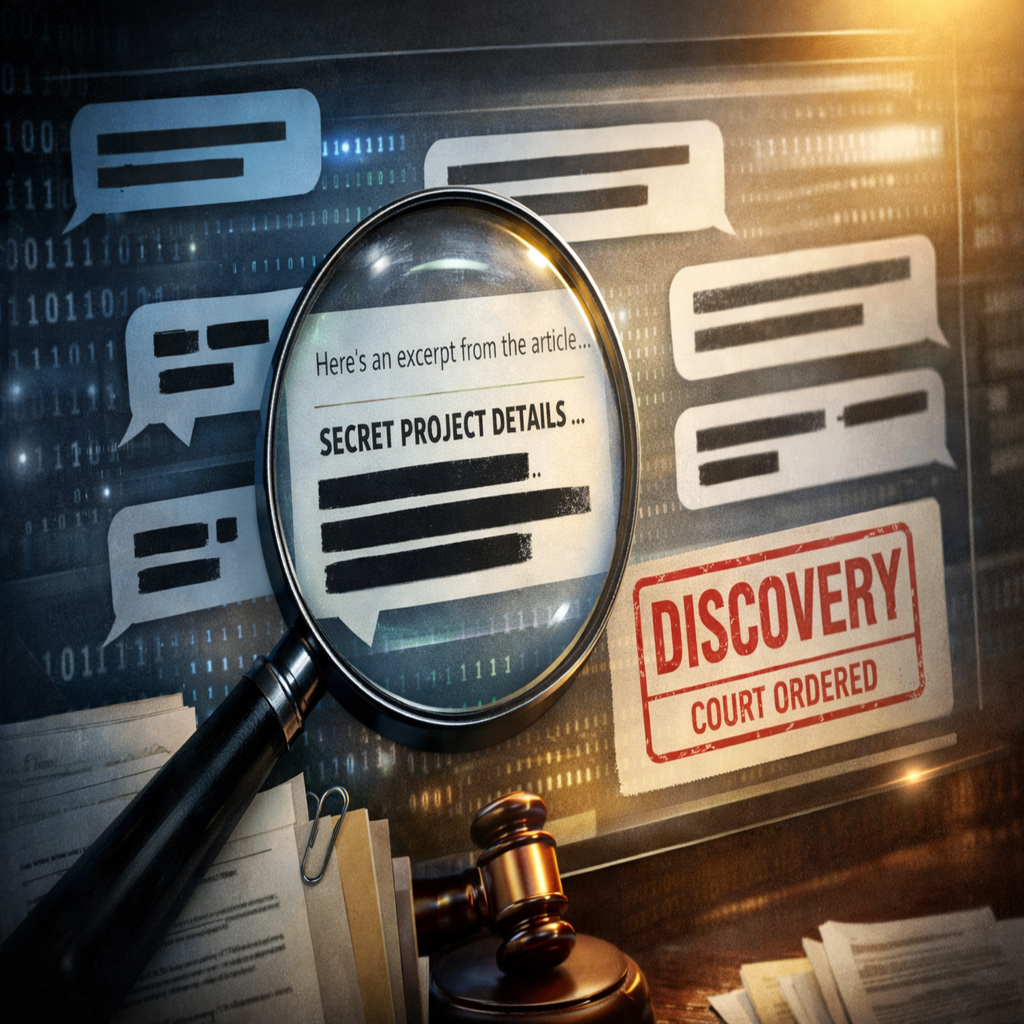Insights < BACK TO ALL INSIGHTS
Chatbots, Copyrights, and the Courts: The Latest in Litigation Developments in the Cases Against OpenAI
FEATURED
January 5, 2026
Chatbots, Copyrights, and the Courts: The Latest in Litigation Developments in the Cases Against OpenAI
By: Abbey Block
Litigation Update: Open AI’s Discovery Woes and Fair Use Defenses in Infringement Lawsuits Since its formation in 2015, the artificial intelligence company “Open AI” – most known for its creation of the widely used chatbot, “ChatGPT” – has faced its fair share of legal disputes. Two of the most notorious lawsuits, one filed by the New York Times and the other by a class of prominent fiction authors, are moving full steam ahead, illustrating the complex interplay of legal rights, litigation tools, and technological innovation. This blog post examines the most recent developments in the lawsuits, and considers what these developments mean for the parties, and the future of artificial intelligence more broadly. Judge Orders Open AI to Disclose Chat…
The Truth Will Out – Even About Mar-a-Lago
December 27, 2025
The Truth Will Out – Even About Mar-a-Lago
By: James Trusty
The Truth Will Out is a fairly obscure phrase that was popularized in Shakespeare’s “The Merchant of Venice.” It suggests that even against the most active obstruction and obfuscation, the Truth seemingly has an invisible hand behind it that relentlessly—if slowly—pushes it into plain view. Nearly 2 ½ years after the FBI’s raid on Mar-a-Lago, the Truth may be emerging into the daylight. August 8,…
White-Collar Sentencing Under the Amended Guidelines: Fewer Steps, Same Dance
November 12, 2025
White-Collar Sentencing Under the Amended Guidelines: Fewer Steps, Same Dance
By: Robert Ward
For years, the U.S. Sentencing Commission’s Guidelines Manual has guided courts through a three-step process to determine the sentence to be imposed. At a high level, that process looked like this: First, the court would calculate the guideline range based on relevant offense conduct and related factors, along with the defendant’s criminal history. Second, the court would consider the Sentencing Commission’s policy statements or commentary…
DC Attorney General Testifies That DC Online Gaming Law Does Not Violate Federal Law
June 30, 2011
DC Attorney General Testifies That DC Online Gaming Law Does Not Violate Federal Law
By: Ifrah Law
The D.C. Council held a hearing on June 29, 2011, to discuss the implementation of a new law that is scheduled to go into full effect on Sept. 8, allowing legal online gaming within the D.C city limits. This would make the District of Columbia the first jurisdiction in the United States to legalize online gaming for money. The hearing also marked the first time…
New House Bill May Open Door to Legal Online Poker
June 26, 2011
New House Bill May Open Door to Legal Online Poker
By: Ifrah Law
The momentum toward federal legalization of online poker took a significant step forward on Friday, June 24, when Rep. Joe Barton (R-Tex.) held a press conference to discuss the details of his legalization bill. The “Internet Gambling Prohibition, Poker Consumer Protection, and Strengthening UIGEA Act of 2011” would both legalize online poker and create a new federal agency to oversee its administration. Rep. Barton said…
Court of Appeals 9th Circuit to D.C. Circuit: We’ll See You in [The Supreme] Court
June 24, 2011
Court of Appeals 9th Circuit to D.C. Circuit: We’ll See You in [The Supreme] Court
By: Ifrah Law
Yesterday, the US Court of Appeals for the 9th Circuit cleared the way for the extortion case against Former Rep. Rick Renzi (R-Ariz.) to proceed to trial. In the process, they flatly disagreed with a 2007 ruling by the Court of Appeals for the D.C. Circuit on a US representative’s right to advance notice for search and seizure. Given this conflict between two appeals courts…
Good-Faith Rule Applies to Document Destruction
June 20, 2011
Good-Faith Rule Applies to Document Destruction
By: Ifrah Law
Big cases can turn on a little rule of evidence called spoliation. The rule recognizes that a trial court has the inherent authority to sanction a party for destroying, altering, or failing to preserve property that the opponent could have used as evidence. A recent decision in the Eastern District of Virginia serves as a reminder that a judge’s decision to award sanctions — and…
Disqualification of AUSA in Scruggs Case Is Message to Prosecutors
June 13, 2011
Disqualification of AUSA in Scruggs Case Is Message to Prosecutors
By: Ifrah Law
The botched prosecution of Senator Ted Stevens was a wake-up call of sorts for the U.S. Department of Justice that there would be severe consequences for prosecutors who did not comply with obligations under Brady and related cases. The Department took another hit recently when a federal judge removed an Assistant United States Attorney from the case against the son of disgraced anti-tobacco attorney Richard…





